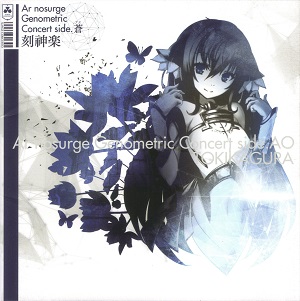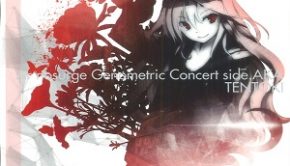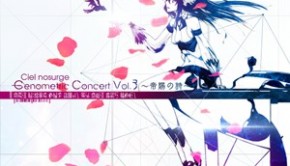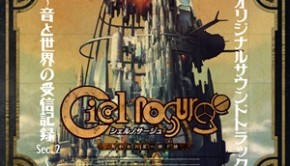Ar nosurge Genometric Concert Side Blue –Tokikagura-
 |
Album Title: Ar nosurge Genometric Concert Side Blue –Tokikagura- |
| Record Label: Gust |
|
| Catalog No.: GUSTCD-11012 |
|
| Release Date: March 05, 2014 |
|
| Purchase: Buy Used Copy |
Overview
Two years after Ciel nosurge was released and while its players were waiting for its two final chapters, Gust released its RPG sequel Ar nosurge: Ode to an Unborn Star. Unlike its predecessor, which divided its music in volumes according to the point in story in which it was heard, Ar nosurge employs for its music the same way of division that was used in the Ar tonelico games: an original soundtrack and two vocal albums. The album covered in this review is one of the vocal ones, which was composed by Kazuki Yanagawa, Kenji Kawai, Akiko Shikata and Toru Ishitsuka, with Shikata and Russian singer Origa serving as the vocalists. However, does it still have the magic that the songs from the previous games in that universe had? Or is it lacking in comparison to them?
Body
First, I’ll give an introduction to the game setting: 5000 years have passed after the story of Ciel nosurge came to an end, in which the migration from Ra Ciela to a new planet ended in failure and thus the people were forced to board the Colony Ship Soreil and roam through space to find a new home to live in. All of the main characters put themselves into cryostasis to wait until the day they were necessary again, and have awakened up to find the ship in chaos due to creatures called Sharl kidnapping the humans and taking them away to some unknown place. While most humans are defenseless against them due to their ability to use Song Magic, a few people called Weavers can use Song Magic themselves to defend against the Sharls and manipulate Soreil’s systems. This means that Song Magic in Ar nosurge is divided into two main classes: Song Magic created by Sharls, Genom and Weavers, which receive the name “Hymmn”; and special Songs that are programmed into Soreil’s main systems, the Surge Concerto Terminal, in order to give it commands and instructions, which receive the name “Cieln” and always have the phrase “Class::” in their names.
Now then, album opens up with an instrumental piece called “Distance”, which while it begins as an accordion and music box duet, it slowly grows in complexity adding a guitar, percussion and violin. While it isn’t really the most standout track in the album and it has the typical markings of a Kazuki Yanagawa piece, it serves as a nice introduction to the album. However, the song has some electronic voices and sounds inserted near its ending, which while they might seem to be coming somewhat out of nowhere, they actually have a purpose.
Said purpose is connecting it to the next track, which is the first proper vocal song. It’s titled “Class::CIEL_NOSURGE;”, and after opening with the sound of an old radio starting up, we hear Akiko Shikata singing with a melody that is a pitch-shifted version of the Ciel nosurge BGM “Genometrics”. This borrowed melody is then made to crescendo for a short time before settling into a more calm tone which has all the markings of a classical Kagura dance song that would be employed in a Japanese Shinto ceremony. However, it does have a stronger and more chaotic section near the middle that wouldn’t be out of place in the celebration of a matsuri.
Now well, the reason this song has these sounds and the peculiarity for it having the name of the previous game are as follows: Ionasal.kkll.Preciel, the heroine of Ciel nosurge and one of the main characters in Ar nosurge, isn’t actually singing this song in-game out of her own volition, but because her memories and ego were destroyed, and thus she is little more than a puppet for the game’s main antagonists Zill and Nero. However, the song is still deeply connected to the game world, which is why it reuses the melody and lyrics of the Ciel nosurge opening theme “To the Songless Hill” at the start. As for the effect Class::CIEL_NOSURGE; has in-game, it is to open up an interdimensional window to our world in order to extract energy from it, which would allow Ion to mass-produce Sharls without compromising her life, as a human can only normally give birth to about five Sharls before dying due to the large amount of life force that creating such beings require. And as a matter of fact, the Ciel nosurge game is supposed to actually be a program that interacts with the signals sent from this song, as during that game we scanned barcodes to create Sharls that could be used to repair Ion’s memories rather than hostile ones that attacked humans. In short, we could say that through the opening of that interdimensional window, this song was the actual point of origin for both games in the Surge Concerto series. And curiously enough, this song also serves as the definitive ending theme for Ciel nosurge, as it can be heard during its final credits roll.
Next we come to “Class::XIO_PROCEED”, which by Shikata’s own admission has a very mechanical sound. After a somewhat calm opening section that incorporates electronic sounds, the song accelerates in rhythm as a violin kicks in and Shikata begins singing with a strong sense of despair. After another somewhat calm section, and a beautiful violin and singing interlude, we come to the main refrain: a section filled with strong vocals and choruses, and a sorrowful violin backing that finally turns into a violin and electric guitar duet. After a short beautiful choral section, we come back to the refrain, which ends up in a section filled with desperate choruses and chaotic violin sounds, and it finally ends up in a sad guitar and flute section. We hear Shikata’s voice one final time, and the song closes off.
We could say this song is like a more mechanical version of “EXEC_FLIP_ARPHAGE/.” from Ar tonelico Qoga: Knell of Ar Ciel, as it’s split in two halves that are notoriously different when it comes to rhythm and arrangement, aside of the refrain, and the purpose it has in the story of Ar nosurge is being pretty much a power switch for the entire Soreil. The ship has two power modes: one where it extracts energy from other dimensions to sustain itself, and another where it extracts it from living creatures that have been put in an area near the core of the ship called the Flask Sea, the latter being one that is supposed to be only used for emergencies. However, the antagonists switched the power mode to extracting life force from the people that were submerged in the Flask Sea to force the Sharls to act more desperately in bringing the humans there, and after they forced the souls of the people to fuse into a monster called the Maternal Overseer, the entire Soreil was suffering from a generalized power shortage that would cause it shut down entirely and kill everyone on it if the power mode wasn’t reverted to its original state. So Ion sang this song in the main terminal of the ship, but the initial singing failed because the ship had to be powered off for it to work. After the power was turned off, Ion began singing again, but this led to one of the most sorrowful scenes in the game: the antagonists tried to stop her by attacking her with a satellite-mounted cannon, and our avatar in the game: the robot Earthes, had to step in between to protect her, getting himself destroyed in the process. This last part coincides with the very ending of the song, showing off Ion’s shock and sorrow upon seeing her friend and protector turned into scrap, but it also made her feeling swell to the point in which the effect of the song was executed successfully. Additionally, I have to say that this song starts differently in the game: it starts with a nice choral introduction before settling down into the mechanical section, but that introduction is drowned out by the rest of the music in the album release.
Now we come to the next track, which aside of being the longest in the album, also served as a nice surprise to long-time Ar tonelico fans when they noticed how closely it related to the setting of Ar Ciel. It’s titled “Lxa ti-cia”, which means “Forgiveness of Souls” in the Ar Ciela language, even though it’s written using the notation from Emotional Song Pact. According to Shikata, it reuses the samples she had previously used for the “Forest of Shelanoir” song from her “Singing Hill –Ar=Ciel Ar=Dor-“ album, and I can only agree with that upon hearing it due to both songs having similar sounding instrumentation. Opening with a soft introduction formed by flutes, percussion, bouzouki and Shikata’s voice, the song begins gaining speed little by little until it settles into the rhythm that can be heard for most of it. It has a few calm vocal sections and some parts where the instrumentation crescendos for a magnificent closing, but for the most part the song itself doesn’t change much in sound. Despite this, it’s a very exciting piece that makes the listener want to dance at its rhythm.
As it might be deduced, this song is in Japanese and Ar Ciela, and it was sung by Ion and the main Will of Ar Ciel, Horus to help Kanon and Cosal train their souls, so Cosal would become a new Will of the Planet in order to recreate Ra Ciela and Kanon would become his priestess. Ion was supposed to sing this song in order to lead them through the right path so they could fight their own inner demons and purify themselves from them to reach the enlightenment necessary to accomplish their roles. So Ion is acting pretty much like a cheerleader for them as they temper their souls. As for the reason for the tribal sound and the stark difference it has with the previous songs, it is because the song itself represents the region of Syestine where the Teru originate from, and it’s sung at the very heart of Shelanoir’s Forest.
Next, we come to the final battle theme “Ra Ciel Reincarnation”. Composed by Kenji Kawai and sung in conjunction by Shikata and the Tokyo Philharmonic Chorus, it starts with Shikata singing softly over a piano backdrop to then give way to the philharmonic chorus and a strings group, which has a very beautiful sound. Shikata then comes in again, and the song explodes into its true form: a beautiful choral-orchestral piece where the members of the chorus sing alongside her. While there are some calm sections, the song itself never loses its energy up to the end, and its sound is brimming with positive energy, making it an excellent listen.
This song was created by Ion’s friends after they chained with Cosal to turn him into the Will of the Planet for Ra Ciela, and it serves to use the same Spherial Rings that destroyed the planet so many years ago to recreate it. It was initially interrupted by the antagonist, who tried using the energy gathered by it to complete their Maternal Overseer monstrosity, but Ion’s friends managed to stop it and buy Ion enough time to sing this song with the people, rendering the monster powerless, annihilating it and creating a new planet for everyone in Soreil to live in. While unfortunately the string and chorus section at the beginning is repeated ad nauseum in-game during the first phase of the final battle, to the point it makes it hard to appreciate its beauty, it can be noticed when listened standalone. And it also should be mentioned that we can see the recreation of Ra Ciela in the final battle’s background as we defeat each part of the final boss, first starting with a mass of rock and culminating in a beautiful blue sphere with a sun shining behind it.
Next we come to Origa’s contributions, and while at first I didn’t know what to expect from her because I’m not familiar at all with her previous works, I have to say I was very pleased with her. The first of her songs is “em-pyei-n vari-fen jang;”, which was composed by Toru Ishitsuka, opens with a beautiful combination of her operatic voice with a cello line, to then crescendo in a spectacular way between her voice, the harp, and percussion. After that the song settles into its main form: a sad ballad formed by Origa’s voice, strings, guitar, mandolin and flute. While the refrain has a stronger touch than the rest of the song, it generally doesn’t change much from its emotional tone, and it ends in the same way its second repetition starts.
This song is sung by Kanon at several points during the game’s story in order to extract the souls of the Genoms that perished with Ra Ciela’s destruction from the Micro Quasar the planet was turned into, allowing them to be reincarnated in Sharl bodies, which is why it sounds so sorrowful: Kanon is wishing to atone in behalf of all humanity due to the extermination of an entire race and the destruction of their planet of origin. However, this song has another purpose later on: it was used to force the souls the Maternal Overseer had absorbed to separate from it, rendering it completely powerless and returning hope to the people that lived in Soreil. However, it shouldn’t be overlooked that this is also the very first song we can hear in the game after starting it for the first time, as it can be heard over the narration that shows how Ra Ciela was destroyed and the people were forced to wander aimlessly through space in search of a new home.
However, the next song is pretty much the polar opposite of this in atmosphere and tone. It’s titled “yal fii-ne noh-iar;”, which means “Planet that Protects the Souls” in Emotional Song Pact. Composed by a newcomer called dottedline hiroko and arranged by Toru Ishitsuka, it starts with a strong chorus section followed by an alternation between harp chords and a chorus, until it crescendos with a combination of bagpipes, strings and tolling bells. After this brief interlude the song proper starts: Origa singing with lots of energy, strings marking the rhythm alongside the percussion, and the rest of the orchestra giving volume to an already strong composition. In contraposition to “em-pyei-n vari-fen jang;”, which could be considered as a ply or mourning song, “yal fii-ne noh-iar;” could be considered more like rallying call, making it greatly uplifting for the listener.
However, I have to add that the in-story effect of this song isn’t pleasant in the slightest: Kanon sings it in order to bring about an event that has the same name as the song’s title, which in our terms could be considered as akin to the Final Judgment that is supposed to take place at the end of the Apocalypse, so basically humans would be judged depending on if their souls are worthy of living in the faux planet of Sharlanoia the Sharls are creating by kidnapping the humans and imprisoning them in the Flask Sea. If their souls are worthy, they may live in Sharlanoia along with the Sharls, but if they don’t, they would dissolve away and their souls would become part of the land and the plants on it. Given this is a horrible outcome for the humans due to the judgment being stacked against them, Delta and Cass (the other protagonists aside of Ion and Earthes) had to jump in and stop Kanon from completing the song. In the end they managed to do so, but unfortunately the song was advanced enough to complete the so-called “Womb of the Planet”: a mass of souls made from the people that were in the Flask Sea at the time, which was used as the basis for the creation of the Maternal Overseer. The song also separated Cosal definitively from Kanon’s body and gave him physical form, allowing him to act without needing Kanon to do anything else.
And now we come to the last proper song in the album, which is also the ending theme heard in the True Ending. Titled “With the You of This World, and to the You of That World”, it starts with Shikata singing softly over a soft bell backdrop to then give way to a pleasant ocarina, bouzouki and strings melody. Generally the song keeps a pleasant, calm and cute atmosphere through its entire duration, and while it has a slightly random section formed by ocarina and Shikata’s voice near the start of the second repetition, it gives off a nice feeling and definitive sensation of conclusion to the entire journey they have gone through.
As mentioned previously, this song can only be heard in the game if the player has attained the true ending, in which the player and the main cast learn from the antagonist (indirectly) that it’s possible for Ion and Nero to return to their respective dimensions if they head to the center of the universe to meet the Will of EXA_PICO and sing with it. Therefore, having decided to go back home and right before boarding Soreil one last time with Earthes and Nero, Ion sings this song filled with her feelings toward her Ra Ciela friends, and also, toward us the players for having been at her side all this time, supporting and helping her however we could, and also bidding us farewell, knowing it’s very possible we may never meet again. If I may say it myself, there’s no better way to express it than by saying the main phrase of the song in Emotional Song Pact, REON-4213 and Ar Ciela: “Thank you and goodbye…” during the refrain, which also makes it a very emotional song.
Next we come to another instrumental piece made by Kazuki Yanagawa titled “-K”, which serves as the closing number for the main part of the album. It starts with some computer and electronic sounds, to then give way to water droplet sounds and a piano melody. The song then grows in complexity with the addition of strings a little bit into it, and I can only say this song is pretty much a final farewell for us from that world, given its tone and feeling of finality, and the fact the computer sounds at the beginning are actually the same ones that can be heard when the Ar nosurge OS (the true form of the game in-universe) that keeps us connected to the EXA_PICO universe shuts down at the very end of the game.
However, that doesn’t mean we’re finished with the album just yet, as there are other seven short tracks at the end that correspond to the Song Magic pieces that Ion can use in battle, and that actually have vocals to them. I could say we can get an idea of all the facets Shikata uses in composition and singing in them, with “Hymmn::CHUMPI;”, “Hymmn::SEXY_METAL_IDOL;” and “Hymmn::I_HAVE_NO_ROYALTY_INCOME;” falling more towards the side of folk, pop and cutesy; “Hymmn::ARTIFICIAL_FLOWER;” starting like a dream-like song before turning into something worthy of a nightmare; “Hymmn::AMENO_MURAKUMO_MIKUJI” following the pattern of traditional Japanese music, and “Hymmn::7TH_APOCALYPSE;” being a progressive rock song. And I can’t leave out “Hymmn::TOKIKAGURA_TENTOUKI”, which aside of featuring the titles of both Genometric Concerts in the title, is also a duet between Shikata and Haruka Shimotsuki, which is something we haven’t seen since the days of Ar tonelico II: Melody of Metafalica, though it’s more pop and electronica in nature than anything. However, each individual piece fits perfectly with the being each Song Magic summons in game, and I have to say that listening to them while watching the animations to each of them ranges from funny to awesome.
Summary
Overall, I have to say I was very pleased with this new iteration of the music from EXA_PICO, as Shikata is still in as good a shape as she has always been, still being a force to be reckoned when it comes to her vocal, compositional and arrangement skills, which also got to shine in collaboration with a high-profile composer like Kenji Kawai, while Origa’s addition to the series’ roster is quite welcome due to her marvelous voice, and the composers Toru Ishizuka and dottedline hiroko, which worked with her, also did a marvelous job in her songs. However, this only makes it even sadder that this game was also her final work before her untimely death. As they in Ar Ciel, yasra dius manaf. Kazuki Yanagawa’s contributions were excellent as well, as the instrumentals fit perfectly with the game world and the places they occupy in the album. So while as always the songs are more enjoyable after listening them in the game, I have to say they still work wonderfully as a standalone listen, and I can easily recommend this album to everyone that likes the music from Ar tonelico or from any of the artists involved. Additionally, anyone who likes electronica, folk and Japanese classical music should also give it a try to see if it matches their tastes.
Do you agree with the review and score? Let us know in the comments below!
5.0
Posted on March 14, 2018 by Gerardo Iuliani. Last modified on March 14, 2018.














